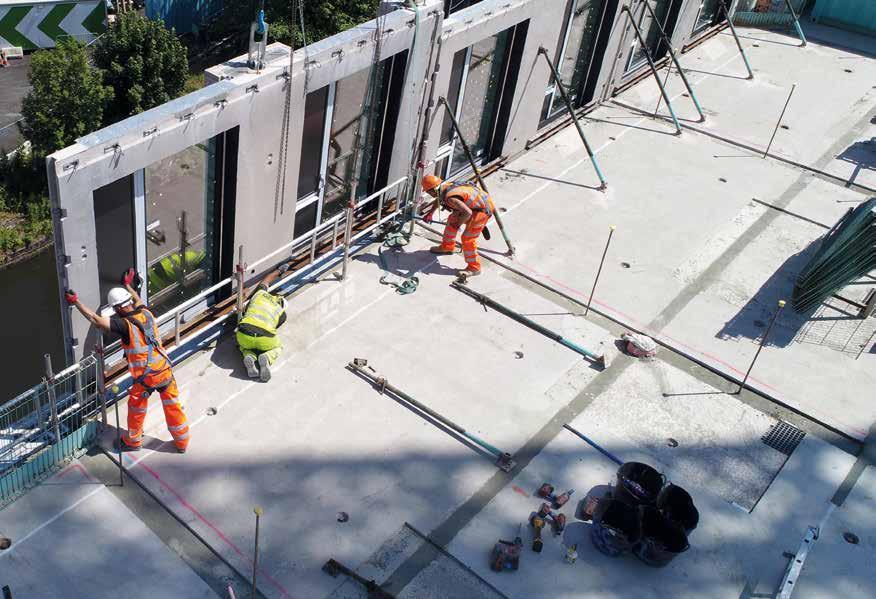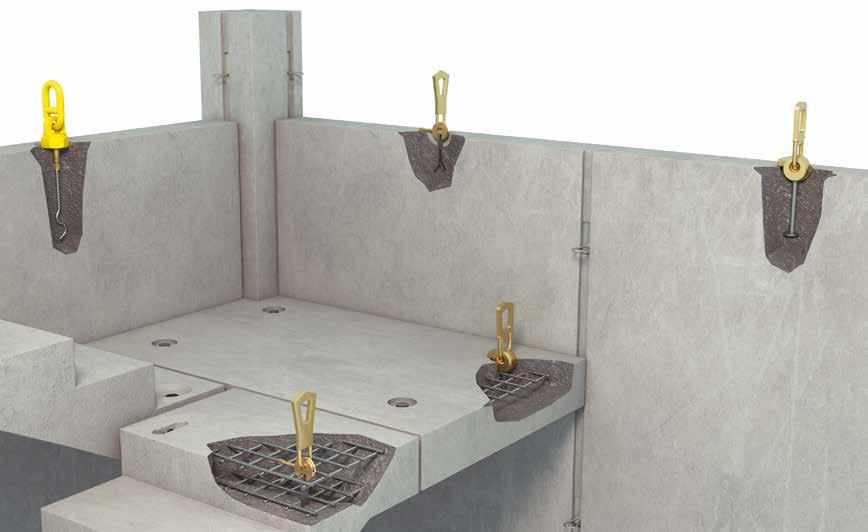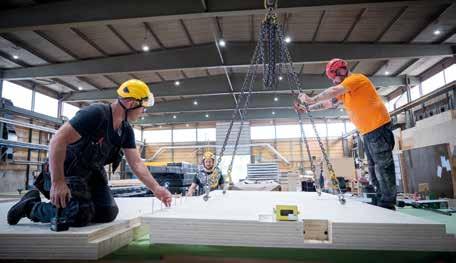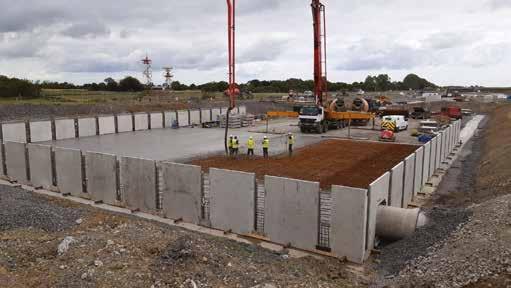
4 minute read
MAKE UK MODULAR INSIGHT IMPACT & INFLUENCE
desire to really make an impact on the housing crisis. Of course, we can’t simply rest on our laurels.
With all the understandable noise about the short-term prospects of the housing market it’s easy to lose sight of the medium and long-term. Of course, this is a true in Government as it is in business. Over the next 12 months we’re likely to see political parties commit to new (most likely vague) targets around the total number of homes built, increasing home ownership, increasing affordable housing, and greening our old, cold housing stock.
However, as our recent report ‘Who will be the builders? Modular’s role in solving the housing labour crisis’ shows, there is a whopping great elephant in the room. Labour shortages. No Government can come close to its 300,000 new homes a year target by 2025 or even by 2030 without dramatic change in way we build houses the construction workforce is simply too small. Let alone can they deliver the net zero and building safety retrofit our housing stock so badly needs.
To say that politics has been volatile since Make UK Modular launched in December 2021 is an understatement. But, as politicians begin to turn their thoughts towards a general election, one thing is clear – housing has slowly, inexorably, and perhaps inevitably returned to frontline politics.
For the team at Make UK Modular this means redoubling our efforts. In our year one impact report ‘Insight, Impact & Influence 2022’ we made strong initial progress in a number of areas. Our priority for year one was to establish ourselves as the voice of the modular housing sector by:
• Establishing a strong working relationship with Government, the opposition, MPs, and the Civil Service
• Building a robust and credible evidence base about the benefits and potential of modular housing
• Establishing and delivering against policy priorities
• Delivering a consistent, positive media and public affairs presence
• Growing our membership.
I’m proud that we made significant progress on all of these areas so quickly. It’s a testimony to the can-do attitude of our members and their
Even if all planning rules were abolished and housebuilding had all the cash ministers could throw at it, the sector could still build no more homes as they don’t have the specialist workforce to make them. A big part of the solution, is, of course, driving up the number of housebuilding apprentices which delivered only 11,000 completed apprenticeships for the entire construction industry last year.
We also need to look at how we build, and how we bring people from different backgrounds into housebuilding. Modular homes can be a mainstay of this because these factory-made houses target a different pool of
WHAT NEEDS TO CHANGE?
As outlined in the report ‘Who will be the builders? Modular’s role in solving the housing labour crisis’, if we are to have any chance of delivering 300,000 homes a year by 2030 modular housing must be scaled up and put at the forefront of any Government’s housebuilding strategy. The following policy changes would require no additional spending by government but would help to grow modular so that it can drive up housing supply and lead much-needed market transformation in housebuilding, delivering greener, better homes faster.
1. Sustainability: Enhance housebuilding sustainability by introducing a more robust commitment to and targets for net zero
• Bring forward requirements for all new homes to perform at EPC A

• Adjust stamp duty rates based on energy efficiency and net-zero performance.
• Require all for sale and to let homes to provide accurate data on energy bills.
• Introduce a carbon trading scheme for new build housing.
2. Scale: Dedicate at least 40% of the Affordable Homes Programme to MMC, and at least 50% of this to modular
• Dedicate at least 40% of the Affordable Housing Programme (AHP) to modern methods of construction
• Dedicate at least 50% of this share to modular (Category 1)
• Switch public Value for Money assessments from focusing on upfront costs to considering value across the whole life of a house.
3. Capacity and Supply Chain: Decrease barriers to market for modular manufacturers
• Remove the unintended double levy charge on modular manufacturers by exempting them from the scope of the CITB levy (because few modular manufacturers benefit from a scheme delivering traditional construction skills, but they still have to pay into it).
• Repurpose the £10million allocated to the MMC Taskforce to support a supply chain improvement programme like those government have supported in aerospace, civil nuclear and offshore wind.
4. Planning and Land: Government to provide a fast-track planning route for modular or low-carbon homes and require a minimum percentage of its land bank to be allocated for modular homes
Currently, modular has to navigate a planning system designed for traditional builders. It can be slow and add significant delays for modular manufacturers, reducing the time-saving benefits that modular can bring. Government can reduce these barriers to modular, while also helping to provide modular manufacturers with a steady supply of land for housing. We would like:
• Government to provide a fast-track planning route for all net zero housing schemes; these should be prioritised for accelerated planning permission.
• Government to ensure modular homes are given parity with traditional build in all local plans.
• Government to require a minimum percentile of its land bank to be allocated to modular housing (Category 1) and/or EPC A rated or low-carbon housing – or give priority or discounts to land used for low-carbon housing. This percentile of land should be subject to a ratchet mechanism increasing year on year.
• Government frameworks should mirror this ratchet with increased weighting towards modular housing in their scoring criteria.
5. Levelling Up: Create a modular capacity strategy linking new factory location, high housing demand areas, and levelling up priority regions






